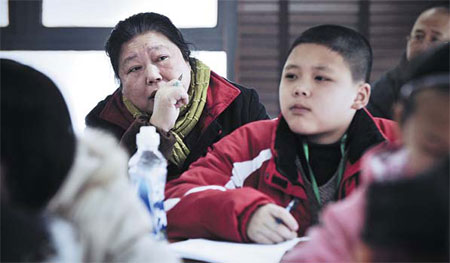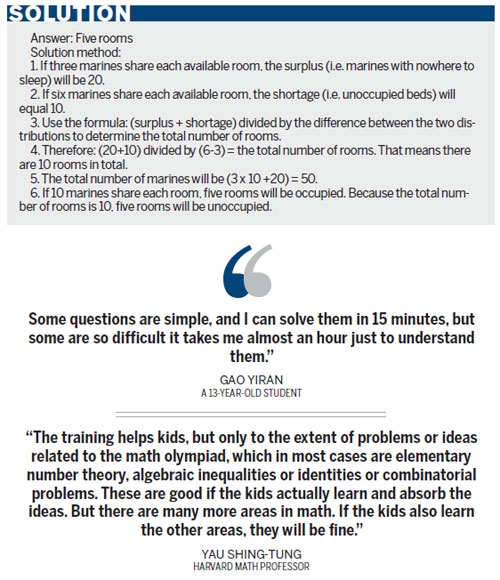
Wang Fengshu watches with concern etched on her face as her grandson Tang Haolong figures it out at a math olympiad class in Wuhan, Hubei province. Provided to China Daily.

Olympiads for young children could be a damaging formula, reports Luo Wangshu in Beijing.
OK, answer this question. The marines are assigning dorms to new recruits. If each available room is shared by three marines, 20 will have nowhere to sleep. If six share a room, two lucky marines can each have a room to themselves. If 10 share each room, how many rooms will be left unoccupied?
This may not be a tough assignment for an experienced sergeant or applicants for high school or college, but the brainteaser (answer on page 6) isn't for them. It's for 8-year-old students at after-school or weekend classes in Beijing.
In August, the city's education authority banned schools from awarding places to students simply on the basis of an outstanding performance in the Mathematics Olympiads, held every academic year, in November, April, May and June.
However, dozens of math-training courses under names such as Advance Mathematics, Logical Training or Happy Math are still thriving by teaching the skills required to solve problems as difficult as those included in the math olympiad.
The phenomenon has attracted the attention of the Ministry of Education, which intends to lessen the influence of the olympiads, according to Yuan Guiren, the minister, at a news conference in September.
The influence of the math competition has been highlighted by the issue of access to good middle schools. A dearth of satisfactory educational resources is at the root of the problem, said Yuan, adding that the State Council has already planned the distribution of resources.
Li Songyuan should soon have no difficulty solving the marine sergeant's quandary over rooms. She started additional math tuition in the summer, and even though she's only a third-grader, she's a late starter.
"I am OK with math olympiad class, but I prefer physical education," said the 8-year-old, who attends a three-hour math class every Sunday evening.
Although the classes, which cost 2,700 yuan ($434) for 15 sessions, are officially known simply as "math class", the girl still refers to it as math olympiad class.
Li's class has nine students, all accompanied by their diligent parents, including her mother Zhao Xingli, 35. Zhao takes notes and discusses the questions with the other kids and their parents. "I come to every class with her, no matter what, storms or blizzards," she said.
"The questions are difficult. I couldn't solve them if I didn't attend the class, but it means I can help with her homework. She is not gifted at math and so we go through the questions together after class," she explained.
Zhao hopes her daughter can win a medal at an upcoming city-level math competition to ease her path to a better middle school.
A family affair
Zhao and Li make up just one of the parent-child combinations attending what are in all but name, math olympiad classes.
"I hope he can win awards at math competitions, after taking the extra teaching, and gain entry to a good middle school," said one father, who would only give his surname as Chi.
His 8-year-old son is the most active student in his class, consistently the first to shout out answers and making a point of discussing the problems with the teacher.
Gao Zhenhai is proud that his 13-year-old daughter, Gao Yiran, has won three awards at city-level math competitions in Beijing. Her success was rewarded when she was offered a place at the Experimental School attached to Haidian Teacher Training College, a key middle school in the Chinese capital.
Gao Yiran studied for the math olympiad from 2007 to until earlier this year, but has now stopped attending the classes. "The questions were not easy for her, which meant she had to work extremely hard. I don't want her to burn out," said Gao Zhenhai, who didn't expect his daughter to become a mathematician or win international math competitions. "I just wanted her to go to a good school," he said
"I hope she builds on this solid foundation in math. The subject is so important, even in middle school and college," he said. He has spent almost 10,000 yuan annually on his daughter's math training, more than 10 percent of the family's annual income.
While Gao Zhenhai's intention was purely pragmatic, Chi said that math olympiad training helps kids to think logically and can inspire a genuine interest in the subject.
However, Wang Wen, 44, was skeptical that the extra classes would help her son. "I know he is not gifted at math, and I think it's more important for him to discover his own interests rather than feeding him mine or those of society," said Wang.
"Not all kids are geniuses, and I have to admit that mine isn't," she added. "It also costs a lot, so if it's not doing him any good, why force him to go?"
However, some children take it upon themselves to study even harder. Gao Yiran works on one extra math question every day. "Some questions are simple, and I can solve them in 15 minutes, but some are so difficult it takes me almost an hour just to understand them," she said.
The girl also raises her work-rate as competitions approach. "I double the study time in the month before to prepare for the competition," she said. In city-level competitions, students are rewarded if they gain a score of 40 percent or higher. Those with scores above 65 percent are awarded a gold medal.

Copyright ©1999-2011 Chinanews.com. All rights reserved.
Reproduction in whole or in part without permission is prohibited.